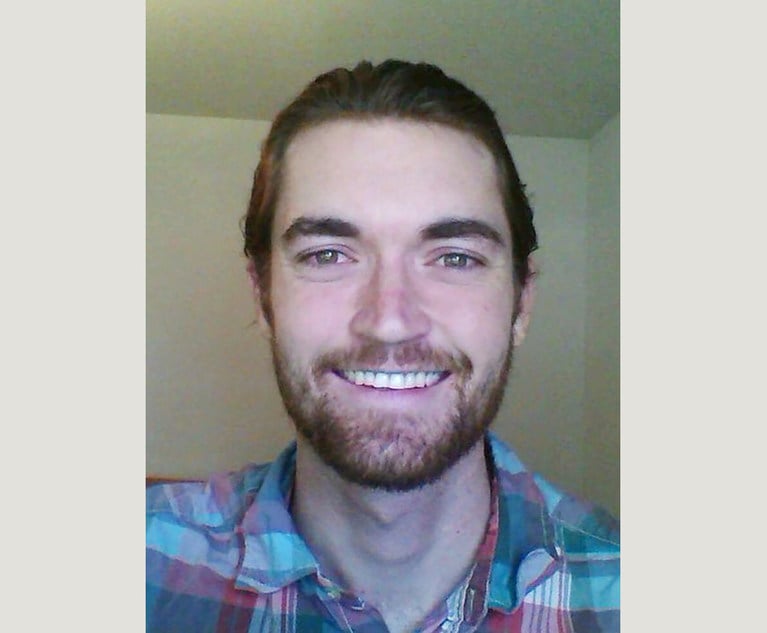My Sister-in-Law Died by Assisted Suicide: Connecticut Braces for Aid-in-Dying Bill
Connecticut legislators will discuss an aid-in-dying bill this year, as proponent and opponents draw battle lines, and brace for litigation.
February 19, 2020 at 10:37 AM
4 minute read
 Connecticut Legislative Office Building in Hartford. Photo: Google
Connecticut Legislative Office Building in Hartford. Photo: Google
Attorneys are watching as Connecticut weighs becoming the ninth state in the country to adopt an "aid-in-dying" law.
But ethics expert Audrey Chapman is looking on with special interest.
For Chapman, a professor of medical ethics at the University of Connecticut Health Center, the issue is not just an ethical or legal matter—it's personal.
Chapman, who favors Connecticut's proposed assisted-suicide bill, said her sister-in-law decided how to end her life about a year ago in Colorado, where assisted suicide is legal. Her relative had just weeks to live, and was in a lot of pain.
"For people who are often in that situation, it's not about a matter of trying to prolong their life," Chapman said. "Rather, it prolongs their death and suffering."
But lawyers expect challenges, as the state Legislature plans to hold public hearings by March on the 2020 version of the bill, which came out of the Public Health Committee late Friday.
Day Pitney partner Brad Gallant, who has worked on trusts and estates for more than 30 years, said the ethical concerns vary—leaving attorneys bracing for uncertainty. For instance: What happens if a third party wants to assist in taking someone's life for financial gain?
Gallant supports the right to assisted suicide, calling it "an issue of fundamental individual liberty."
Expect pushback
Longtime Connecticut attorney Audrey Blondin, who opposes the proposed law, expects a legal battle, if the measure passes.
"If this becomes law, I foresee a time where a group would get together and challenge the legality of the right to assisted suicide in court. I absolutely see that," Blondin said. "It would probably go to Superior Court and move its way up the ladder to the state Supreme Court, just as happened with the death penalty."
In the same way, the fight could jump from the state to the U.S. Supreme Court, which has ruled the death penalty constitutional.
Chapman also sees red flags for the legal and medical professions.
"Another important ethical concern is what kind of care a patient has, and whether or not there have been competent efforts to have a physician reduce the pain," Chapman said. "One would not want a patient to make a decision because they can't get appropriate medical care."
The Connecticut bill, which passed through the state's Public Health Committee 12-9, is fashioned after legislation in states that have aid-in-dying laws in place, according to Mary Abrams, co-chairwoman of the committee. California, Colorado, Hawaii, Maine, New Jersey, Oregon, Vermont, Washington and the District of Columbia all have such laws. But a similar bill has failed in Connecticut numerous times in recent years.
The next step is a public hearing and vote, no later than March 27. The bill would then need the support of the majority of the legislators, and Gov. Ned Lamont would need to sign off on it for it to become law.
Under the current iteration, Abrams said the Connecticut legislation contains language that only people who have six months or less to live would qualify for assisted suicides. Plus, the patient would have to provide written and verbal consent, must be in extreme pain, and must have two doctors sign off on the decision. The death would then proceed via a liquid drug, Abrams said.
But opposition will be strong and fierce, Chapman believes.
"I see pushback across the board, not only from the Roman Catholic community, but from many others," Chapman said. "The law in most states is in favor of trying to maintain life. Obviously, this law would contradict that. There will be a lot of opposition for both religious and ethical reasons."
Blondin agrees.
"I can respect the argument of a person's right to self-determination but, again, I do not believe that outweighs the duty to take someone's life," she said. "I think you will see an immediate mobilization of the Catholic Church and many other religious lobbies to oppose this, much the same way groups mobilized against legalizing marijuana."
But Abrams, who supports the legislation, doesn't anticipate its broad application.
"The people who will avail themselves of this option if this becomes law would be quite small," she said. "It gives people peace of mind, and control over their own situation. It also gives them comfort to know that they ultimately have that control."
This content has been archived. It is available through our partners, LexisNexis® and Bloomberg Law.
To view this content, please continue to their sites.
Not a Lexis Subscriber?
Subscribe Now
Not a Bloomberg Law Subscriber?
Subscribe Now
NOT FOR REPRINT
© 2025 ALM Global, LLC, All Rights Reserved. Request academic re-use from www.copyright.com. All other uses, submit a request to [email protected]. For more information visit Asset & Logo Licensing.
You Might Like
View All
Settlement Allows Spouses of U.S. Citizens to Reopen Removal Proceedings
4 minute read
Judge Awards Over $350K in Attorney Fees in Data Breach Class Action Settlement
3 minute read
Silk Road Founder Ross Ulbricht Has New York Sentence Pardoned by Trump
3 minute read
Preparing for Change? These Leaders Have Already Done It. Plus, Managing Partner Survey Results
8 minute readLaw Firms Mentioned
Trending Stories
- 1Departing Attorneys Sue Their Former Law Firm
- 2Pa. High Court: Concrete Proof Not Needed to Weigh Grounds for Preliminary Injunction Order
- 3'Something Else Is Coming': DOGE Established, but With Limited Scope
- 4Polsinelli Picks Up Corporate Health Care Partner From Greenberg Traurig in LA
- 5Kirkland Lands in Phila., but Rate Pressure May Limit the High-Flying Firm's Growth Prospects
Who Got The Work
J. Brugh Lower of Gibbons has entered an appearance for industrial equipment supplier Devco Corporation in a pending trademark infringement lawsuit. The suit, accusing the defendant of selling knock-off Graco products, was filed Dec. 18 in New Jersey District Court by Rivkin Radler on behalf of Graco Inc. and Graco Minnesota. The case, assigned to U.S. District Judge Zahid N. Quraishi, is 3:24-cv-11294, Graco Inc. et al v. Devco Corporation.
Who Got The Work
Rebecca Maller-Stein and Kent A. Yalowitz of Arnold & Porter Kaye Scholer have entered their appearances for Hanaco Venture Capital and its executives, Lior Prosor and David Frankel, in a pending securities lawsuit. The action, filed on Dec. 24 in New York Southern District Court by Zell, Aron & Co. on behalf of Goldeneye Advisors, accuses the defendants of negligently and fraudulently managing the plaintiff's $1 million investment. The case, assigned to U.S. District Judge Vernon S. Broderick, is 1:24-cv-09918, Goldeneye Advisors, LLC v. Hanaco Venture Capital, Ltd. et al.
Who Got The Work
Attorneys from A&O Shearman has stepped in as defense counsel for Toronto-Dominion Bank and other defendants in a pending securities class action. The suit, filed Dec. 11 in New York Southern District Court by Bleichmar Fonti & Auld, accuses the defendants of concealing the bank's 'pervasive' deficiencies in regards to its compliance with the Bank Secrecy Act and the quality of its anti-money laundering controls. The case, assigned to U.S. District Judge Arun Subramanian, is 1:24-cv-09445, Gonzalez v. The Toronto-Dominion Bank et al.
Who Got The Work
Crown Castle International, a Pennsylvania company providing shared communications infrastructure, has turned to Luke D. Wolf of Gordon Rees Scully Mansukhani to fend off a pending breach-of-contract lawsuit. The court action, filed Nov. 25 in Michigan Eastern District Court by Hooper Hathaway PC on behalf of The Town Residences LLC, accuses Crown Castle of failing to transfer approximately $30,000 in utility payments from T-Mobile in breach of a roof-top lease and assignment agreement. The case, assigned to U.S. District Judge Susan K. Declercq, is 2:24-cv-13131, The Town Residences LLC v. T-Mobile US, Inc. et al.
Who Got The Work
Wilfred P. Coronato and Daniel M. Schwartz of McCarter & English have stepped in as defense counsel to Electrolux Home Products Inc. in a pending product liability lawsuit. The court action, filed Nov. 26 in New York Eastern District Court by Poulos Lopiccolo PC and Nagel Rice LLP on behalf of David Stern, alleges that the defendant's refrigerators’ drawers and shelving repeatedly break and fall apart within months after purchase. The case, assigned to U.S. District Judge Joan M. Azrack, is 2:24-cv-08204, Stern v. Electrolux Home Products, Inc.
Featured Firms
Law Offices of Gary Martin Hays & Associates, P.C.
(470) 294-1674
Law Offices of Mark E. Salomone
(857) 444-6468
Smith & Hassler
(713) 739-1250










